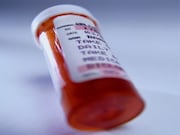Diabetes, polyarticular gout, prior opioid use tied to increased risk for opioid prescription at discharge
MONDAY, July 15, 2019 (HealthDay News) — More than one-fourth of patients with acute gout discharged from the emergency department receive an opioid prescription, according to a study published online July 2 in Arthritis Care & Research.
Deepan S. Dalal, M.D., M.P.H., from Brown University in Providence, Rhode Island, and colleagues used electronic health records from Lifespan Healthcare facilities (2.2 million records) to identify adult patients discharged from the emergency department or hospital with a primary diagnosis of gout between March 30, 2015, and Sept. 30, 2017.
The researchers found that of 456 patients identified, 28.3 percent received an opioid prescription at discharge. Approximately 80 percent were new prescriptions. The average prescription dose was 37.9 mg of morphine equivalent for a median of eight days (range, five to 14 days). More than one-quarter of patients received an opioid prescription for ≥14 days, which is longer than the natural course of a typical gout attack. Patients with polyarticular gout attack and diabetes, as well as those using opioids prior to admission, had higher odds of receiving an opioid prescription at discharge.
“This study highlights an opportunity to curb the opioid epidemic among gout patients,” the authors write.
Copyright © 2019 HealthDay. All rights reserved.








